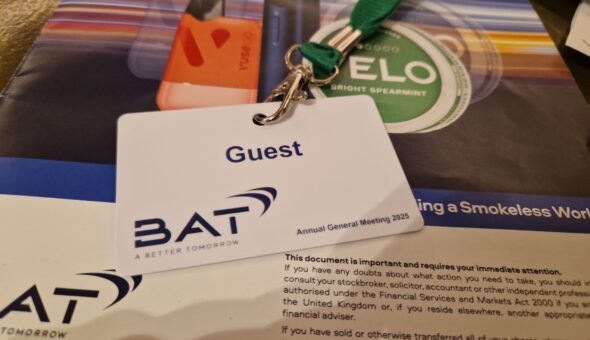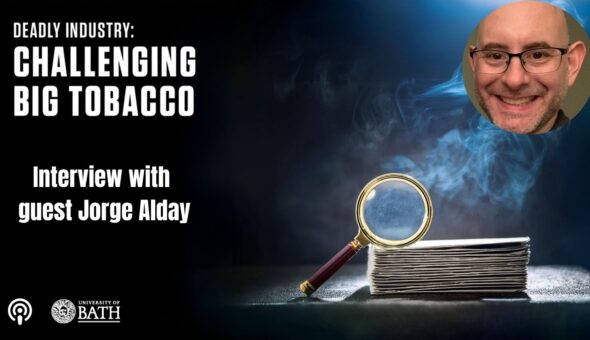Whistleblowers have played a vital role in exposing malpractice, not least in the tobacco industry. Phil Chamberlain, Managing Editor of Tobacco Tactics, spoke to Jeffrey Wigand, "the man who knew too much", about his experiences.
In December 2021 three whistleblowers who had helped expose dirty tricks by British American Tobacco were honoured.
Francois van der Westhuizen, Pieter Snyders and Paul Hopkins were among ten whistleblowers given an award by Blueprint for Free Speech. At the ceremony it was noted that the ten have paid prices ranging from retaliation, intimidation, loss of jobs and family, being hounded by police and government agencies and businesses and even death.
The role of whistleblowers
Whistleblowers have often been crucial in our understanding of the tobacco industry and feared by the industry as a result. As Tom Mueller reports in Crisis of Conscience: Whistleblowing in the age of fraud, in 1971 consumer champion Ralph Nader organised a major conference on whistleblowing. It alarmed corporate America and the US Chamber of Commerce had tobacco lawyer Lewis Powell write a memorandum on how to respond. “No thoughtful person can question that the American economic system is under broad attack,” Powell wrote. Shortly after, Powell was elevated to the Supreme Court.
Exposing the tobacco industry
At the same time, Jeffrey Wigand was just starting on his career in chemistry. He worked for several pharmaceutical and health companies before joining tobacco firm Brown & Williamson in 1989 as head of research and development. He came to public attention in 1996, when he appeared on the CBS programme 60 Minutes. His devastating testimony was that Brown & Williamson had knowingly manipulated its products to increase the nicotine potency and added carcinogens without telling anyone.
Brown & Williamson went all out to discredit Wigand, hiring private detectives, lawyers and PR firms and circulating a 500-page dossier to smear him. CBS’s corporate owners and its journalists battled each other over the story. However, it aired and Wigand subsequently became a teacher. He remains involved in tobacco control as an expert witness in many US lawsuits against tobacco companies.
Brown & Williamson is owned by British American Tobacco.
Talking to Jeffrey Wigand
We spoke to Jeffrey Wigand from the basement of his home in Michigan along with his Bernese Mountain dog Maggie May. We asked about his experiences as a whistleblower.
Bath: How seriously did you have to protect yourself once you had gone public?
JW: Ultimately had armed protective services. I didn't want it but I had it. And I'm glad I had it. They opened my mail in the morning. I had lots of bomb threats so they started my car up when I went to school and they checked my classroom out. They made sure there was nothing sitting there waiting for me. I would teach until about 3 o'clock and then they came and picked me up, escorted me home.
Bath: Do people still approach you with information?
JW: I have two types of whistleblower who approach me. One is the whistleblower or potential whistleblower who wants guidance. And the second one wants to get paid. I need corroboration for what they are saying and they have got to be clean.
Bath: Do you worry about people approaching you that have been put up by the companies?
JW: Oh yeah. Listen, I'm in rural Michigan and I get my windows and my quad busted when I testify. They haven't left me alone. They still have messages that I get.
Bath: When you see how the tobacco companies develop new products do you get despondent? It seems like the old playbook coming around again?
JW: First of all, I don't get despondent about what they do. It just gives me any further incentive to try to bury them. Not to be so pugilistic about it but these b******s go after children.
Bath: For those in the industry looking to talk, what do they need to do to protect themselves?
JW: If they can, they need to move away from where they live. The second is don't talk to anybody else. Loose lips sink ships. Don’t go bragging about it. Make sure you have a competent lawyer. Make sure you get whatever financial asset you have protected in some way. I can tell you I used to go over my house very carefully every time I came home to see if anybody had been there. When they put out the physical threats it is not so cute.
Bath: Do you think there's anything now that could be done to better support people coming forward?
JW: Make sure you're not doing this as a solo act. This has to be with you, your partner, and your children because things will never, ever be the same.
Bath: These companies never seem to forget or forgive.
JW: For sure.
Jeffery Wigand’s story was turned into a film, The Insider, where he was played by Russell Crowe. Al Pacino played journalist Lowell Bergman who worked on the story. The script was based on a 1996 Vanity Fair article, The Man Who Knew Too Much, which details the pressure Wigand was under as he came out against the industry. His experiences are familiar to other tobacco whistleblowers. Wigand remains the most senior industry insider to have come forward.
We discuss tobacco industry whistleblowing in our podcast Deadly Industry: Challenging Big Tobacco - listen here.



